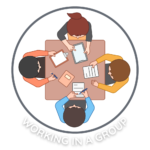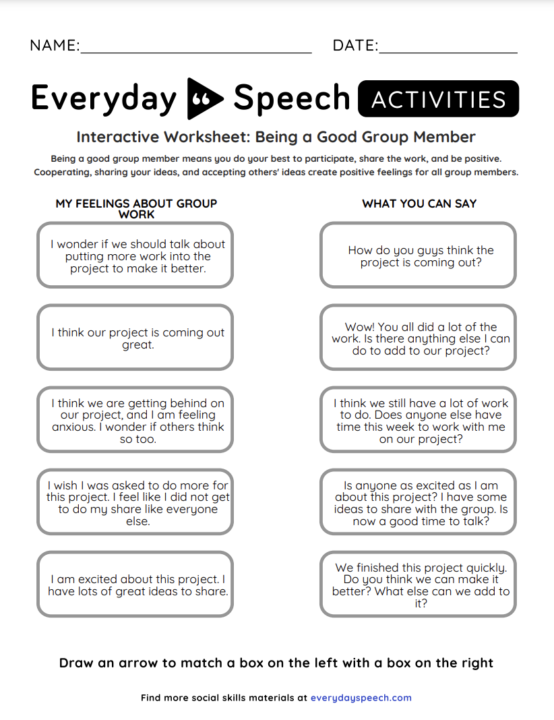
Group work is a vital skill that students need to succeed in school and beyond. For elementary students, especially those with unique learning needs, understanding how to be a good group member is crucial. Special educators play an essential role in preparing elementary students for group work.
Everyday Speech offers a comprehensive unit on Working With a Group, including interactive worksheets like “Being a Good Group Member.” This resource provides students with practical language and strategies to express their feelings, share ideas, and stay engaged. In this post, we’ll explore effective ways to teach group work skills to elementary students, highlighting how Everyday Speech can support you along the way.
Teaching Group Work Skills: Starting with the Basics
To successfully work in a group, students need to understand a few fundamental concepts. These include sharing responsibilities, respecting others’ ideas, and staying positive. Many students, especially those in special education, need clear, step-by-step guidance to develop these skills.
Begin with Self-Awareness
Help students identify how they feel about group work. Everyday Speech’s “Being a Good Group Member” worksheet encourages students to reflect on their emotions before expressing them. This activity is a fantastic tool for helping students identify thoughts like, “I think our project is coming out great,” and then match those thoughts with appropriate responses, such as, “How do you guys think the project is coming out?”
Understanding and managing emotions are essential first steps in preparing elementary students for group work. The clearer students are about their feelings, the easier it is to communicate with their peers.
Model Positive Group Behaviors
Show students examples of positive behaviors in a group setting. For instance, demonstrate how to politely ask for feedback or suggest ideas. Everyday Speech’s Working With a Group unit provides video modeling to show students what positive group interactions look like. Watching examples can make the abstract concept of “teamwork” feel more real and achievable.
Key Skills for Being a Good Group Member
When preparing elementary students for group work, focus on these core skills. Each skill can be taught through simple, direct lessons and reinforced with Everyday Speech’s resources.
1. Active Listening
Listening is one of the most crucial skills in group work. Teach students to pay attention when others are speaking. Reinforce that listening helps them learn from their peers.
Activity Idea: Practice active listening by pairing students and giving them a specific task. One student shares an idea, and the other repeats it back. This shows they’ve understood.
2. Sharing Ideas Respectfully
Encourage students to share their ideas but also to be open to others’ thoughts. In a group setting, every student should feel heard. Everyday Speech’s worksheet offers prompts like, “I wonder if we should put more work into the project to make it better,” which encourages students to think about improvement and invites input from their group.
3. Taking Turns
Learning to take turns prevents students from talking over each other and helps everyone participate equally. Role-playing can be an effective way to practice this skill. Assign specific roles within the group, allowing each student a chance to lead and follow.
Using Everyday Speech’s “Being a Good Group Member” Worksheet
Everyday Speech’s “Being a Good Group Member” worksheet is a practical tool that helps students understand group work expectations. This interactive worksheet provides structured language that students can use in different scenarios.
For instance, students can choose responses like, “Wow! You all did a lot of the work. Is there anything else I can add?” to show appreciation and willingness to contribute. This type of structured guidance helps students understand what to say and when, making group interactions smoother and more positive.

How to Use This Worksheet Effectively
- Introduce the Worksheet
Start by explaining what it means to be a good group member. Use examples and model the kind of language students will see in the worksheet. - Practice Matching Statements
Ask students to draw arrows to match their feelings with appropriate responses. This activity helps them learn how to express themselves in a group and respond to others respectfully. - Encourage Role-Play
After completing the worksheet, engage students in a role-play activity where they practice these responses in a small group setting. Role-play can make the lessons more memorable and give students confidence to apply them in real-life group work. - Reinforce Over Time
Like any social skill, being a good group member takes practice. Use this worksheet regularly to help students build these skills gradually.
Unlock all of our Elementary Group Work Activities by signing up for your free trial today – no credit card required!
Access the full Social Communication Curriculum HERE!
Instant access to thousands of no-prep social skills activities, over 1000+ video lessons, and engaging games designed to enhance learning and development.
Building Confidence in Group Work Settings
For some students, group work can be intimidating. They might feel anxious about speaking up or unsure of how to contribute. Everyday Speech’s resources, especially the Working With a Group unit, offer consistent practice and positive reinforcement to help students feel more comfortable.
Fostering a Positive Group Atmosphere
Encourage students to express their thoughts constructively. For example, if a student feels the group is behind on a project, they might say, “I think we still have a lot of work to do. Does anyone else have time this week to work with me on our project?” Statements like these model constructive ways to share concerns and motivate the group to take action.
Creating a classroom environment where every student’s input is valued can make group work a positive experience. Remind students that group work is a team effort and that every voice matters.
FAQs for Special Educators
Q: How can I support students who are shy about sharing their ideas?
A: Start small. Encourage them to share ideas in pairs before a group. Building confidence gradually can help them feel more comfortable speaking up.
Q: What should I do if students are struggling to take turns?
A: Use visual cues or set a timer to ensure each student gets equal speaking time. Remind students that group work means everyone gets a chance to contribute.
Q: How can I make group work fun for students?
A: Use engaging themes or relate projects to topics they’re passionate about. Fun projects keep students motivated and help them enjoy working with others.
Everyday Speech’s Working With a Group Unit: A Resource for Success
Everyday Speech’s Working With a Group unit provides structured support for teaching group work skills. This unit includes worksheets, video modeling, and activities that cover everything from expressing feelings to respecting others’ ideas. With Everyday Speech, you have a complete toolkit to help students succeed in group settings, making your role as a special educator easier and more impactful.
By preparing elementary students for group work through clear expectations and interactive activities, you’re setting them up for a lifetime of positive teamwork experiences. Everyday Speech’s resources give you the tools to foster these essential skills in a fun, engaging way.
Conclusion: Preparing Elementary Students for Group Work
Preparing elementary students for group work takes patience, practice, and the right resources. Everyday Speech’s “Being a Good Group Member” worksheet is an effective tool for teaching students how to communicate, listen, and collaborate respectfully. With structured prompts and interactive exercises, this resource helps students understand how to be considerate and effective in group settings.
By using Everyday Speech’s Working With a Group unit, you can support your students as they develop these critical skills. With your guidance, they’ll learn to navigate group work with confidence, setting a strong foundation for future social and academic success.
Sample Video
Students learn best by watching others their same-age model the behavior! Check out a sample video modeling lesson below. We offer our entire Social-Emotional Learning platform free for 14 days here!
Related Blog Posts:
Teaching Elementary Students Group Work in the Classroom
Enhancing Group Work Skills in Elementary Students: A Guide for Educators
Teaching Participation: Engaging in Group Activities for Elementary Students





